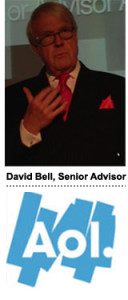 David Bell, the chairman emeritus for Interpublic Group, offered his take on some barriers to growth in digital advertising today at Aol’s Thought Leadership Summit on programmatic advertising.
David Bell, the chairman emeritus for Interpublic Group, offered his take on some barriers to growth in digital advertising today at Aol’s Thought Leadership Summit on programmatic advertising.
Number one on his hit list was the clutter of ad tech startups. He also took aim at the power wielded by procurement officers and bashed the ad industry for being meek in the face of legal and regulatory challenges around privacy.
Ad Tech Complexity. “The dollars flowing into ad tech have slowed,” Bell said in his keynote address. “Those companies that haven’t gone public and are generating less than $10 million will have trouble getting funding. There will be a wave of consolidation and some companies will just close up. That said, the benefits of simplification are huge. And that’s what’s coming.”
Procurement. Given the number and range of vendors and tools advertisers have had to work with, it’s no surprise that marketers’ procurement officers have taken control of ad budgets. But with all the focus on ROI and demands for greater accountability, the process of advertising has gained more science and lost much of its art, Bell said.
“Procurement has gone bullshit; it’s wreaked havoc in the advertising business,” he said. “They’ve killed ideas. They want everything cheaper, cheaper, cheaper. The value of ideas is different from cost-per-click, cost-per-anything. The good news is, procurement has brought a new level of accountability. And that is a good thing. But it’s not the only thing when it comes to advertising, and we’ve lost sight of that.”
Privacy. Bell expressed his disappointment with how the very people who should understand the value of communication and the art of persuasion better than anyone have surrendered the argument on privacy and third-party cookies to politicians and regulators.
“The privacy police are getting us closer and closer to a non-cookie environment,” Bell said. “The privacy police don’t understand the issues they’re dealing with. And that’s because the advertising industry has done a shit job explaining the value of cookies and how it ultimately serves the consumer in the form of better advertising and free access to content. We can’t seem to get the industry to organize around that idea. That has led to Congressional saber-rattling around privacy. So what should we expect?”
Bell is a senior advisor to Aol and a Bowery Capital CMO Advisor.











